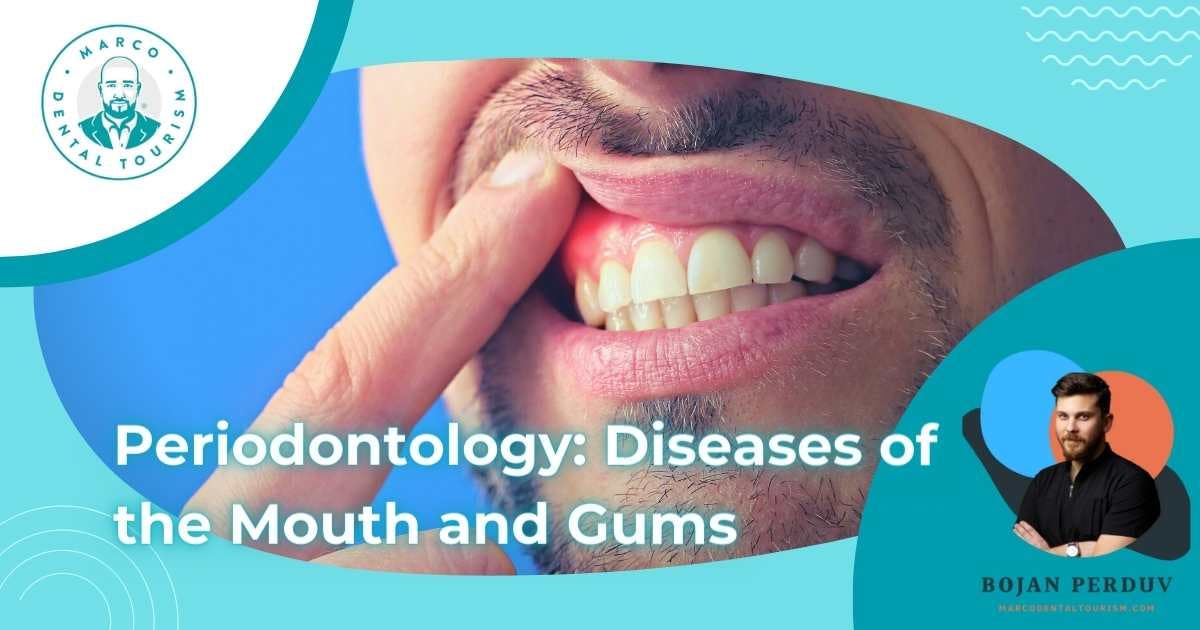Introduction to periodontology

Have you ever wondered why our gums bleed when we brush our teeth? Or why some people have a significantly higher amountdental caries from others? The answer lies in periodontology - a branch of dentistry that focuses on the prevention and treatment of gum disease. From the latest treatments to the importance of preventive care, discover all the interesting facts you need to know about periodontics in this blog. So, get ready to dive deep into the fascinating world of teeth and their importance in our life.
What is periodontology?

From less complicated to more complex and painful forms, the first signs of periodontal diseases are most often:
Bleeding gums: One of the most common signs of periodontal disease is bleeding gums during brushing or flossing. We must note that not all bleeding is necessarily a sign of gum disease, but intense and frequent bleeding that repeats daily. If you notice such a problem with your gums, it would be best to contact your dentist to take further treatment steps.
Swollen gums: Gums that are swollen, red and tender to the touch are also early signs of periodontal disease.
Bad breath: Persistent bad breath or halitosis it can be an indicator of some periodontal disease.
Loose teeth: Teeth that are loose and move when touched are a more serious symptom and require seeing a doctor as soon as possible.
Receding gums: If the gums begin to recede towards the root of the teeth, the reason may be the appearance of one of the diseases of the mouth and gums which causes withdrawal.
What treatments are available for periodontal disease?

From less complicated to more complex and painful forms, the first signs of periodontal diseases are most often:
Bleeding gums: One of the most common signs of periodontal disease is bleeding gums during brushing or flossing. We must note that not all bleeding is necessarily a sign of gum disease, but intense and frequent bleeding that repeats daily. If you notice such a problem with your gums, it would be best to contact your dentist to take further treatment steps.
Swollen gums: Gums that are swollen, red and tender to the touch are also early signs of periodontal disease.
Bad breath: Persistent bad breath or halitosis it can be an indicator of some periodontal disease.
Loose teeth: Teeth that are loose and move when touched are a more serious symptom and require seeing a doctor as soon as possible.
Receding gums: If the gums begin to recede towards the root of the teeth, the reason may be the appearance of one of thediseases of the mouth and gums which causes withdrawal.
What treatments are available for periodontal disease?

Depending on the degree of presence of periodontal disease, the dentist may recommend one of the following methods of treating the mouth and gums:
Scaling: Scaling is a deep cleaning of the teeth and gums, where the dentist removes plaque and calculus from the teeth and below the gum line. This procedure helps to reduce inflammation and infection of the gum tissue.
Antibacterial mouthwash: The dentist may recommend the use of an antibacterial mouthwash that can be used to reduce bacteria and inflammation in the mouth.
Antibiotics: In some cases, the dentist may prescribe antibiotics to treat the infection and inflammation in a timely manner.
Surgical treatment: If periodontal disease is severe, surgery may sometimes be necessary to remove infected tissue and reshape the gum line.
Home care: The dentist may also recommend a special home care routine, such as more regular brushing and flossing and using an antimicrobial mouthwash.
Is periodontal treatment painful?

With advances in modern dental technology, periodontal treatment can be quick, painless and comfortable. Various treatments are available to help effectively protect teeth and gums from disease. So don't let your fear of the dentist prevent you from getting the dental care you need.
How to prevent periodontal diseases?

Although gum disease is very common and widespread today, fortunately there are several daily routines that can help prevent periodontal problems from occurring at all. In your home, try to:
Brush and floss your teeth at least twice a day: Brushing and flossing your teeth twice a day helps remove plaque and build-up tartar on the teeth which is often responsible for the appearance of periodontal diseases.
Visit your dentist for regular checkups: Regular dental checkups every six months can help detect any signs of periodontal disease early, before they become a more serious dental problem.
Use mouthwash daily: Mouthwash can help kill bacteria in your mouth leaving your breath fresh and your mouth clean.
Reduce smoking: Smoking can increase the risk of developing any periodontal disease due to the unfavorable ingredients in cigarettes such as tobacco and tar.
Eat regular and healthy meals: Healthy foods are those that are rich in nutrients that can help keep our teeth and gums healthy. Try to find a measure in everything you take in and you don't have to worry about the consequences.
Stay hydrated: Staying hydrated helps keep the mouth clean and less plaque-free, especially right after exercise.
Exercise regularly: Exercise can help improve blood flow and circulation, which helps keep gums healthier and more resilient.
How can periodontology contribute to health in general?
Periodontology is an invaluable tool for improving oral health by providing comprehensive treatments to protect the gums, teeth and bones that support them. By treating diseases such as gingivitis and periodontitis, periodontics can ultimately lead to strengthening and maintaining health in general.
Conclusion

Periodontology is an ever-evolving field, and its advancements have provided innovative ways that we can rely on to successfully maintain our dental health. From the early diagnosis of gum disease to the development of advanced surgical techniques, periodontology has enabled us to permanently protect our mouth and teeth and enjoy a perfect smile. With continued research, innovation and dedication, we can ensure that our smiles and our oral health remain healthy and vibrant for many years to come.












Share your opinion!
What do you think about this topic?
Comments (0)